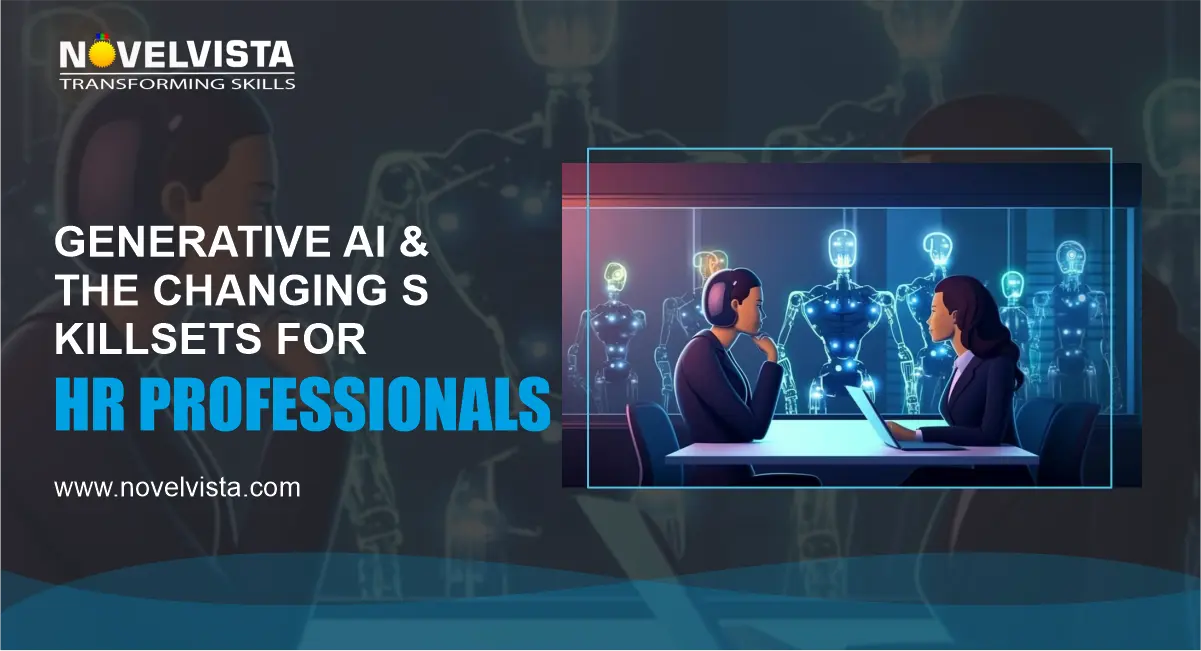Enroll Now and Get Upto 30% Off
* Your personal details are for internal use only and will remain confidential.

Last updated 18/04/2024

Generative AI holds the strong potential to transform the technologies that humans have ever had access to. The impact of this new technology will be felt right across businesses that have HR functions.
As per Gartner, 76% of HR leaders trust that if their business doesn’t adopt AI practices and solutions in the next year, then they will lag behind those businesses that do. Today, we will focus on how Generative AI in the HR Certification Program contributes to Professional's careers and how it impacts their skill sets.
Generative AI’s applications in HR are diverse and touch upon crucial components like talent acquisition, human resource services, and learning, among others. There 77% of Human resource professionals aim to influence GenAI to boost efficiency, while over half seek to enhance the employee experience and nearly 43% to enhance decision-making. Make sure to check Generative AI in HR & L&D Training Program to understand how it works for human resources.

A robust technology, generative AI is not only a fad. It has completely changed how predictive analytics is used in HR. In this regard, organizations' most valuable asset management and nurturing practices are being entirely transformed by the revolutionary potential of generative AI. Here, Generative AI in HR Certification will help you to understand how predictive analytics works.
It improves insights into employee engagement, brings proactive retention strategies, and identifies turnover risks. When it comes to analyzing large volumes of data to identify trends in employee engagement, generative AI shines. This feature offers priceless insights into variables influencing productivity and job happiness, which may help HR enhance procedures and improve the employee experience. It effectively crafts the L&D programs.
A paradigm change has occurred as a result of the integration of generative AI, which offers creative solutions that reshape the HR industry. Chatbots and virtual assistants driven by AI are becoming essential parts of HR operations. Generative AI is undoubtedly a driver for good change and has the potential to improve HR processes in a number of ways.
It contributes to instant and accurate responses, and Gen AI equips the chatbots with the ability to bring swift and precise responses to a wide range of HR-related issues. Next, it helps in the effective handling of routine HR and administrative tasks where, with the help of AI, repeated and time-consuming HR processes will be easily automated. Also, AI assistance will improve employee experience and engagement.
Ensuring that AI-generated material is free from biases and adheres to diversity and inclusion standards is crucial. HR departments need to take proactive measures to reduce prejudice and discrimination in text produced by Generative AI. Maintaining strict data privacy and security requirements is necessary since sensitive employee data is used in large quantities.
This protects the integrity and confidentiality of the data, which benefits the organization's staff as well. Workers ought to understand how AI interacts with them, and HR should be able to explain and justify AI-generated judgments. In HR procedures where AI is used, transparency is essential to maintaining accountability and maintaining confidence.
Although there are certain obstacles to overcome, there is promise in using generative AI in the HR sector. The intricate technical configuration needed to integrate AI might be daunting. Investments in technology and knowledge are necessary for HR departments.
Furthermore, in order to fully leverage the potential of Generative AI, organizations need to commit resources to train AI talent and make sure HR specialists are knowledgeable about AI technology. Success in using AI requires a fully embraced work environment, which means HR departments need to cultivate a culture of learning and flexibility.
Organizations may better identify individual and team strengths and areas for progress by using generative AI in performance management to evaluate performance data.
Gen AI also contributes to managing the projects sufficiently. HR professionals may customize development initiatives with this data-driven approach, fostering a culture of high performance and optimizing employee potential.
When it comes to staff training, GenAI solutions can provide quizzes, instructional materials, and virtual teaching assistants. One real-world example is the incorporation of an on-demand training resource into a manager conversational interface through a leadership development program. This dramatically improves learning and growth while also streamlining the process of creating information.
The following image showcases the Generative AI priorities for HR Leaders. It is poised to change the future of HR forever, disrupting developed views of work, talent, roles and skills.
As Generative AI is rapidly evolving, HR leaders must stay ahead by understanding the core capabilities and use cases available and, at the same time, planning for the effects Gen AI will have on their businesses.

The first process in assessing the new technology trend, like Generative AI, is to distinguish any myths from reality and reduce any preconceptions. The HR technology lead should work with the Information Technology, legal, compliance, industry, and subject matter experts to understand the true potential of the technology and report back to the HR leadership group. Once they know what the technology can do, they can access the potential use cases and benefits. Certified Generative AI in HR professionals can successfully take advantage of this.
Next, we will include the HR leaders in developing the actual potential benefits of AI and tailoring potential use cases to business-related goals. Concentrate on how Gen AI will help alleviate any functional pains and fulfill your goals by allowing you to perform activities better, faster, and cheaper.
The final step includes assessing and scoring AI solutions against crucial success criteria to understand if adoption should go ahead or not. Each business will have different criteria, but some of the critical areas HR leaders should take into consideration include governance, workforce readiness, risks, and ethics, as well as vendor landscape.

The integration of Generative AI in HR isn’t only just an opportunity but also crucial for staying competitive in the dynamic business environment. Certified Generative AI in HR will successfully embrace the technology to understand the potential of Generative AI as a strategic partner in Human Resource operations.
Employees should invest in education and training so that they will remain equipped with effective use of GenAI tools. Keep in mind that data security is the key. You will get all of these details through the Generative AI in HR & L&D Certification Program.
Generative AI represents a transformative force in the realm of human resources, promising to revolutionize traditional practices and reshape the skill sets required of HR professionals. Its applications span talent acquisition, predictive analytics, chatbots, ethical considerations, performance management, and beyond, fundamentally altering the landscape of HR operations.
As businesses increasingly recognize the potential of Generative AI, HR leaders face the imperative to distinguish reality from myth, harnessing its capabilities to address organizational challenges effectively. Learning and training will be pivotal in ensuring HR professionals are equipped to leverage Generative AI tools responsibly while maintaining data security. Topic Related PostManish has more than 13 yrs of experience in IT Industry and has worked as ITIL Head with expertise in the areas like Enterprise IT Transformation, ITSM, SIAM, Blockchain.
* Your personal details are for internal use only and will remain confidential.